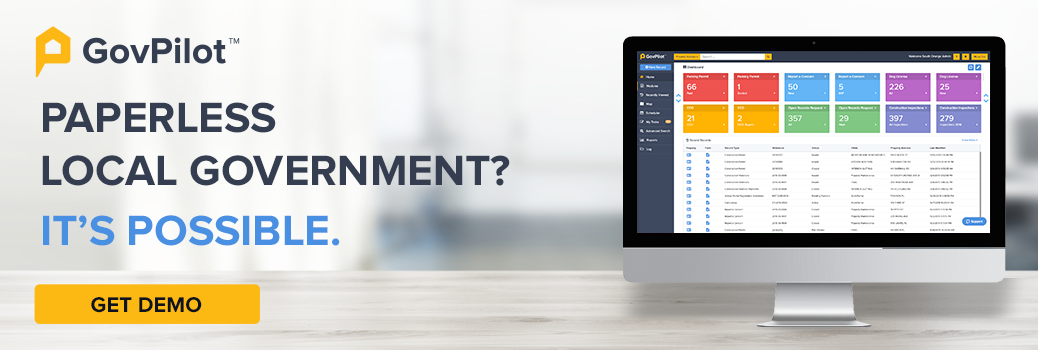City administrators play a significant role in strategizing and allocating budgets across local government departments.
You need to maximize city budgets, execute projects that positively impact your citizens, and successfully manage your local government to earn your continued appointment. Failure to do so could result in wasted budgets, delayed projects, and a worsened local quality of life.
Here are proven considerations and actionable tips to implement as a city manager to make for masterful strategic planning, GovTech, and government project execution.
What are the Key Responsibilities of a City Manager?
City managers (oftentimes referred to as chief city administrators) are key decision makers in local governments. Upon their appointment by the mayor or city council, the city manager is responsible for:
- Formulating government strategic plans (and associated costs for projects and services)
- Determining budgets across government departments and projects
- Assigning leadership roles like department heads
- Executing local policies as determined by the city council
Overall, you're responsible for ensuring continued functionality of government services, local infrastructure, citizen engagement, and other key day to day operational procedures.
How Can City Managers and Administrators Better Perform Their Job?
Modern problems require modern solutions. If your local government is still using antiquated methodologies for making and implementing decisions, here are key considerations to modernize your county or municipality:
1. Collect Insightful Data
It is impossible to make truly informed decisions if you don’t have tangible data to back your hypotheses on the best use cases for government budgets.
Making a government digital transformation by moving public record storage and application filing to an online capacity will allow your government to collect data in real time, and access important information as needed in just a few clicks.
Learn more about the Benefits of Modern Government Data Storage and How to Use Analytics to Make Educated Government Decisions.
2. Automate Where You Can
Government automation saves time and money for everyone involved in your day to day affairs.
Tasks that can be taken off of your government’s plate include public record filing, citizen form completion, government worker scheduling, IT ticketing, court appeal requests, and more.
Here are helpful resources about government technology solutions across departments and how they automate workflows:
- Modern Code Enforcement Technology & Workflows
- Modern Government Fleet Management Workflows
- Modern Government Procurement Technology: What to Consider
- Government IT Strategy: How to Modernize IT Ticketing
- Judicial Software: How to Digitize Your Local Courthouse
- Local Law Enforcement Software: Digitizing Police Processes
3. Encourage Citizen Engagement
If minimal numbers of citizens are attending public meetings, you’re not getting the full picture as a city manager on which issues matter most to your community members.
Encourage improved citizen communications by
- Promoting public meetings and encouraging public discourse from people of various backgrounds to get a true look into the issues that matter to everyone.
- Using digital government communications channels like public complaint software to get text messages from citizens about issues within your community to address along with a 3D GIS map about where it occurred.
- Sharing regular announcements and news with your citizens via government social media profiles (and encourage citizens to engage with the posts!)
- Implementing services and updates your citizens want to see which also helps to attract more people and businesses to your community.
How Does Complaint Management Software Work? Here’s what your local government should know.
4. Have a Vertically Integrated Organizational Structure
City administrators should hear from government officials at all organizational levels to get a well rounded view of the key bottlenecks and challenges of all municipal and/or county departments.
One wise way to let government employees voice their opinions is to prioritize employee feedback when performing government employee performance reviews.
Learn more about improving your government-wide correspondence in the Government Communications Strategy guide.
5. Consider Where Money is Coming In
Collecting revenue from taxes, services, application fees, parking passes, etc. is integral to your local government budget. Consider where each department has money coming in, where it is being allocated, as well as additional opportunities to generate revenue.
Here are common options to increase government revenue:
- Collect application fees for online forms like constructions permits, public record requests, license applications, etc.
- Fees and fines for property taxes, ticket payments, etc. can be collected with an online credit card processing integration with your government management software
- Prioritize local economic development to encourage business investment and population growth in your community.
Learn more about Modern Government Fee & Fine Collection and How to Generate Revenue as a Local Government.
6. Understand What Government Budgets are Being Spent On
City management should have complete knowledge around the projects and services your governmental budget is being spent on.
Cloud-based government software collects financial data in real-time, so that you can get a clear view into how every government department is spending their money. With clear financial data in mind, you can make informed decisions around ways to reduce expenses, services and projects to prioritize/deprioritize based on their costs, and consider where modern government technology can cut down human hours.
7. Set Benchmarks with Government KPIs
Key performance indicators (KPI) should reflect modern problems and actionable ways your local government is working towards modern solutions.
Common government KPIs you should goal set around include:
- Turnaround times for paperwork approvals: how long does it take to get permits, licenses, document requests etc. finalized and approved?
- Government employee retention: are employees sticking around long term? What is the average number of years an employee works for your county or municipality?
- Project completion times: are infrastructure projects being completed quickly and on schedule? Are contractors meeting their deadlines?
- Revenue generation: are you hitting your revenue collection goals?
- Budget allocation: Where are budgets being used? Are projects and services coming in at, or under, cost?
- Regulatory compliance: are you meeting state and federal regulatory compliance? Is your government website ADA compliant?
How Can Government Software Help City Administrators?
Clearly, modern technology can improve your local government in countless ways, from public record storage, to process automation, to data collection, and beyond.
At a glance, here are the key benefits of implementing government management software in your local government:
Government Cloud Storage
You’ve got thousands of records stored in filing cabinets or on-site computer systems already, and thousands more being filed each year. Moving to the government cloud poses multiple benefits, including:
- Track records down in seconds: no more having your employees skim through dozens of boxes of paperwork to track down a specific document every time an OPRA request comes in. By storing records in the cloud, government officials can track down a document in seconds. For city administrators, you’ll be able to find important documents yourself as needed, and can count on dozens of hours saved a month per department previously spent sorting through records.
- Regular data back-ups: keeping your government records secure is essential to your governments’ success. GovPilot backs government data up on a weekly basis, meaning as a city manager you’ll always have insightful government data accessible to use for informed decision making.
Real Time Data Collection
City managers require concrete evidence to justify decisions about where taxpayer dollars and government funds should be allocated.
GovPilot collects data on which types of forms are being filed, where revenue is being generated, the status of projects, what issues matter most to citizens etc. so that city managers can get a real-time view of what’s happening in their community and which departments and issues need to be prioritized in your strategic plan.
- For example, consider how Public Health Data Management is streamlined through orderly data collection.
Improved Communications
City administrators need to speak with the government staff to recognize key roadblocks and challenges in their local government. They also need to speak with constituents to ensure they recognize the key issues they want your government to prioritize.
Luckily, digital government communications platforms make it easy to correspond with both government officials and citizens alike via a simplified text-based platform.
Consider how organizational tasks like supply chain management can be improved through simpler digital communications with private-sector contractors, or how recruiting new, talented tech workers in to your local government can improve digital communications across departments.
Keys to Great City Management
The pressure is on for city managers to maximize their city’s budget to provide top-tier public services and prioritize infrastructure projects that matter. Seriously consider embracing government technology to do so.
Government software can make for:
- Better decision making with insightful data
- Improved government services with automation of tedious administrative tasks
- Streamlined financial planning with revenue and expenses that are visible for each department and universally across your department
- Streamlined government payment processes and services
Don’t wait to make your government digital transformation. To learn more about how GovPilot’s operating system for local governments can help, book a free demo.
Chief City Administrator FAQs
1. What Does a City Manager Do?
City managers (also known as city administrators) are appointed by city councils to make informed strategic planning decisions around the local government’s budget. These municipal and county leaders decide which projects will be prioritized in the future, the budgets for each local government department, and who will be the department heads in each department. They’re also expected to execute local policies as determined by government leadership and the city council.
2. How Can City Administrators Craft a Great Strategic Plan?
An organized government is a functional government. Taking the time as a city manager to craft a well thought out government strategic plan is integral to ensuring your budget is allocated in the most effective manner possible.
Here are a few key ways to ensure your annual and quarterly strategic plans are thorough:
- Hearing from government officials across departments to recognize what challenges they’re facing and what they would like to prioritize in the future. One key inclusive leadership example for getting perspectives from a diverse group of government employees is to inquire during your employee performance reviews.
- Perform government risk assessment to recognize legitimate threats and ways to mitigate them. Issues to consider include national challenges, natural disasters, cyber attacks, intergovernmental roadblocks, economic hardship, and citizen frustrations.
- Leverage key performance indicators (KPIs) to track performance against goals.
- Use government software to collect data on revenue generation and budget allocation so you’re fully aware of how much money your locality has to work with.
Read on:
- Federal Cybersecurity Grants for Local Governments: Everything to Know
- US Infrastructure Bill: What the Bill Means for Local Governments
- American Rescue Plan Act: What the Bill Means for Local Governments
- Local Government Code Enforcement Strategy
- Local Government Water Utilities Strategy
- Managing and Improving Local Public Meetings
- Modern Government Trends, Events, & Technology
- Tornado Mitigation & Disaster Plan
- Wildfire Mitigation & Disaster Plan
- Local Government Disaster Preparedness Guide
- Continuity of Government: Government Procedures During a Crisis
- Government Cybersecurity: How to Prevent Ransomware Attacks
- Government Data Breach Examples & Prevention
Sources









